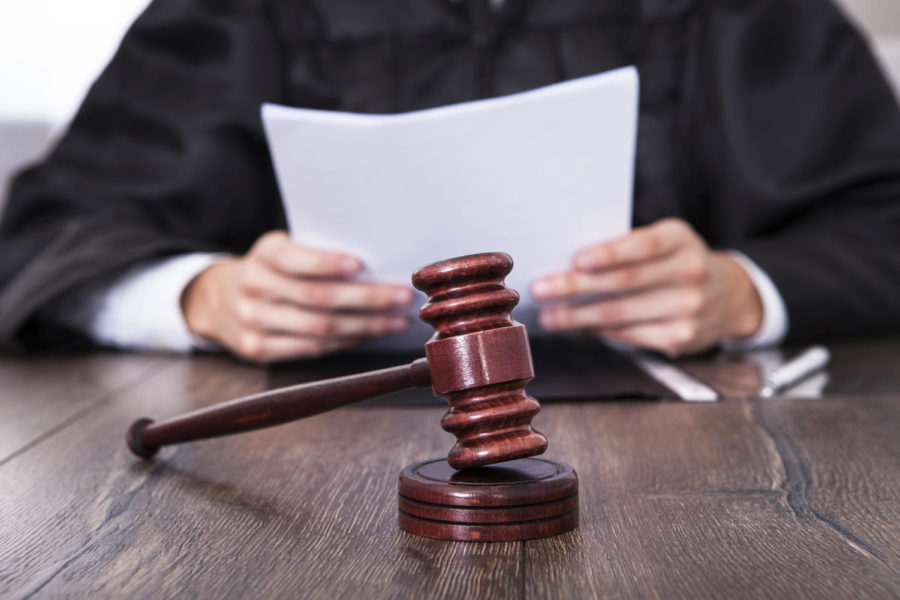Snyder: Let’s end the debate
When it comes to same-sex marriage, columnist Snyder believes there has been more than enough talk about the issue and there is only one way for society to move forward.
May 1, 2015
The United States Supreme Court heard arguments for one of the most anticipated and contentious cases of this judicial season or any other in the past decade. That case is regarding the constitutionality, or lack thereof, of same-sex marriage in the United States. The case will likely not be decided until June, but Americans now have a new reason to argue about it for the next month.
This already prolonged debate has worn away the patience of advocates on both sides and after countless conversations and dozens of columns, even I grow tired of espousing my firmly held belief that we will not live in a truly equitable society until all people can go about their own business. This means business that does not directly impact anyone else, in whatever way they choose. I could repeat to you my same long-practiced lines about the hypocrisy of a “free” nation that puts up arbitrary walls between people simply because it has always been that way. I could say again that modern culture should not and cannot be governed by antiquated social principles based in fear and bigotry. But you’ve heard me say all of those things before, so let’s just take a look at what the Supreme Court justices had to say instead.
Justice Robert Kennedy, who is considered a key vote to swing the decision in either way, offered that “This definition (of marriage) has been with us for millennia and it’s very difficult for the court to say, ‘Oh, well, we know better.'”
To Justice Kennedy I would say, yes, it is difficult. But at what point was your job described as “easy?” The Supreme Court, by the very definition of the institution, is charged with making the most difficult decisions our country has to offer. The highest court we have exists for the very purpose of altering or maintaining our nation’s laws based on our Constitution. And as far as difficulties in saying “Oh, well, we know better,” I would say the following: the Supreme Court seemed to know better when it upheld the Affordable Care Act, the Supreme Court seemed to know better when it struck down the United State’s racist segregation laws and the Supreme Court seemed to know better when it struck down bans on interracial marriage as well.
Arguments against the rewriting of marriage laws in the United States are partially based in preserving the “noble” nature of the institution and the “dignity” which it bestows upon those who enter marriage.
Stop it.
Marriage is no more a noble or dignified institution than taking out a mortgage on your home. That is not meant to be a cynical view as I personally believe in love and the importance of building a life with another person. My view is simply based out of a belief that marriage is no longer a “holy” endeavor. Marriage is a legal agreement. Honestly, what is it about extending the same rights (as it relates to marriage) that are already provided to the majority of the nation that drives people insane? If the reasoning is based in religion, then I have no need to continue my argument as we are not ruled by a theocracy and freedom of religion must also mean freedom from religion. I would wager to guess the majority of people who want to get married and will only be allowed to marry the person they love if the law is changed could not care less what a very old book has to say about their lifestyle. The courts should reflect that apathy.
There was also an interesting occurrence during the arguments in which a spectator had to be removed and detained after shouting, “If you support gay marriage you will burn in hell.” He and his friends seem like a pleasant crowd to hang around with.
However, his crowd is fairly large, so let’s break it down like a boxing match: in this corner, we have a message of hate and exclusion often based in religious sentiment that is not legally permissible as a reason for discrimination. And in the other corner we have a group of people who are asking only to be treated the same as everyone else. No special privileges, just equality.
I find myself standing alongside those in that second corner and I hope you will join me. If you do, and we end up in hell as some will assert, then I say it will have been worth it to have been advocates for justice. Hell will be a manageable punishment if we end up there for doing what we know is right with no expectation of reward.

















